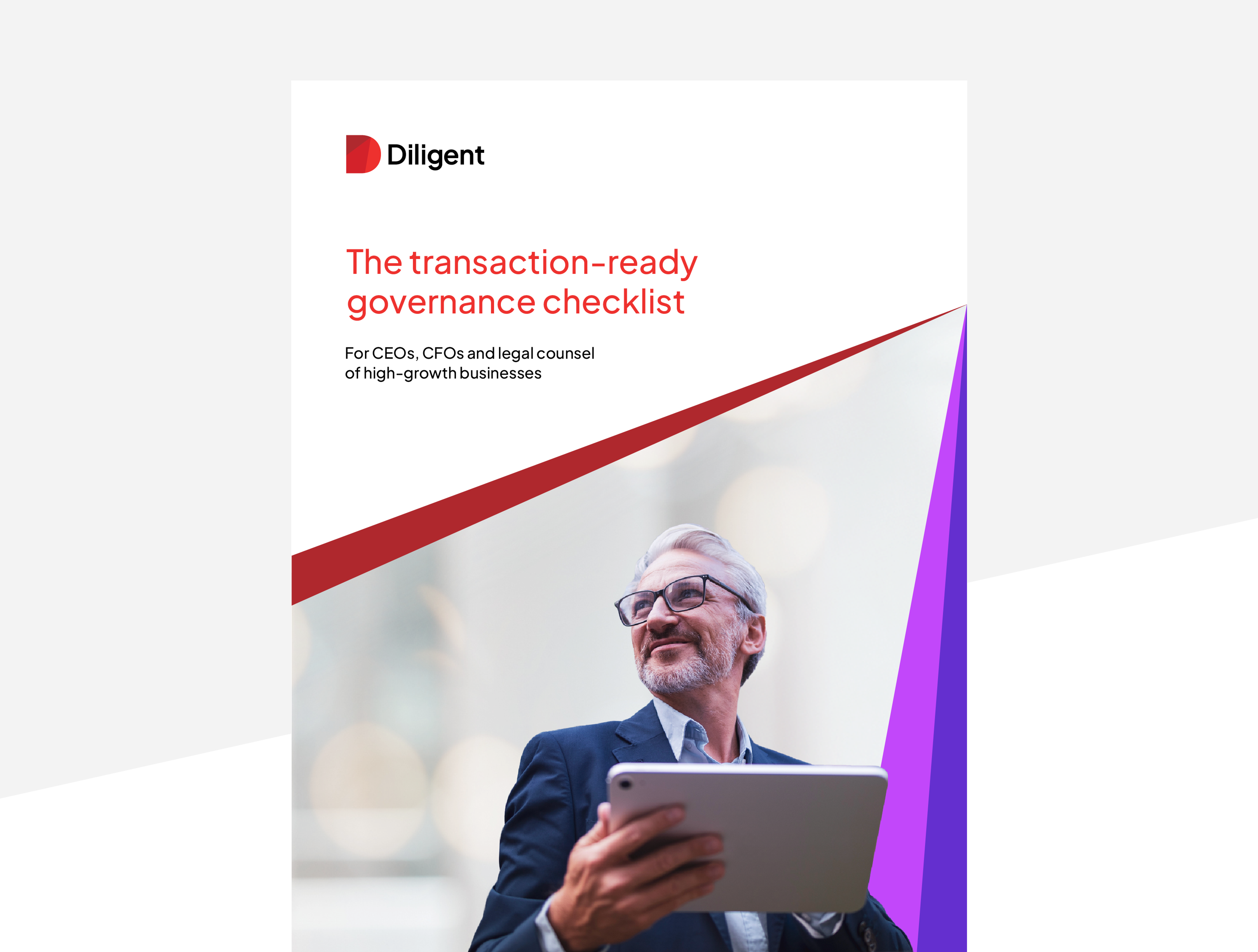Corporate governance for startups: 5 fundamentals that VC investors expect from early-stage companies

For high-growth companies backed by venture capital, scaling fast isn’t optional — it’s the expectation. But while vision, agility and innovation drive early success, corporate governance for startups often lags behind. That’s where growing pains show up.
Whether your next strategic milestone is a Series C raise, putting in place a revolver, secondary sale or eventual IPO, VC investors expect you to mature your governance operations along the way without slowing down your product or growth velocity.
Venture capital firms are less focused on short-term performance metrics and more focused on long-term market opportunity. But they still want to see that your board is functioning, your financials are credible and your leadership team is equipped to grow responsibly. Governance isn’t just for exits — it’s a signal that your company can scale sustainably.
Here are five governance fundamentals venture investors look for — and how startup founders, CEOs or CFOs with lean resources can deliver with the help of AI-powered governance technology.
1. Run board meetings that add value — not just updates
Early-stage boards are often founder-led, informal and lightly structured. But as funding rounds increase and stakes rise, investors expect more strategic engagement. That means your board meetings need to evolve — from check-ins to working sessions that drive alignment and insight.
How to meet expectations:
- Build smart agendas that focus on the right strategic questions — not just reporting updates
- Use AI-powered tools to automate board book creation, highlight key takeaways, and eliminate prep bottlenecks
- Ensure version control across board documents to avoid outdated financials or conflicting metrics
- Centralize governance records (resolutions, minutes, approvals) in a secure, accessible platform
The bottom line: Venture investors don’t want more meetings — they want better ones. Meetings that surface blockers, align on key decisions and support milestone execution.
2. Build investor confidence with credible metrics
In early-stage companies, the data that matters most isn’t EBITDA — it’s product adoption, customer growth, burn rate and runway. But even these startup-centric metrics need to be accurate, consistent and investor-ready.
As companies scale, VCs expect greater reporting discipline — not just for them, but for the next investor or acquirer too.
How to meet expectations:
- Automate the creation of investor updates and board reports using live financial data integrations (e.g., NetSuite)
- Track key growth milestones (ARR, CAC, churn, NPS) alongside financial health indicators
- Use customizable dashboards to align internal reporting with VC expectations — and avoid formatting chaos
- Integrate governance and financial reporting to maintain context and ensure accuracy
The bottom line: Growth-stage companies that communicate clearly and credibly win trust — and often get to “yes” faster in future rounds.
Stay deal-ready, always
Don’t let governance gaps stall your next big opportunity. Grab this AI-powered checklist to keep your board, financials, and compliance always investor-ready.
Get the checklist3. Keep governance light, but proactive
Many founders worry governance will slow them down. VCs know that too — which is why they typically favor scalable, lightweight processes in the early stages. But being proactive on governance now prevents delays later, especially during fundraising or M&A due diligence.
How to meet expectations:
- Establish centralized workflows for common approvals (option grants, board resolutions, contract sign-offs)
- Automate minute-taking and legal document prep with AI to reduce legal spend and admin burden
- Use digital tools to manage director evaluations, conflict checks, and disclosure questionnaires
- Set up a secure data room, fully integrated into your board portal, to store investor-facing materials and compliance records
The bottom line: The best governance systems are the ones you barely notice — until they save you weeks during a raise or audit.
4. Support founder growth with the right governance guardrails
VCs rarely replace founders. But they do expect startup leaders to evolve with the company — and that includes professionalizing their governance posture over time.
VC-backed companies that show maturity in board operations, investor communications and risk management send a clear signal: we’re serious, not just scrappy.
How to meet expectations:
- Use board evaluations to identify gaps and bring on independent directors as needed
- Track key governance metrics and improvements as part of leadership development
- Provide directors with secure, real-time access to materials, updates and market insights
- Benchmark board composition and structure against peers as you approach later rounds
The bottom line: Governance doesn’t replace vision — it reinforces it. It gives founders the tools, partners, and clarity they need to grow with confidence.
5. Stay transaction-ready, even if you’re years away from exit
Your company might be years away from an IPO or acquisition — but the groundwork for those outcomes starts now. Every funding round, loan arrangement, partnership, or strategic pivot adds complexity. Smart companies manage that complexity before it turns into friction.
Being transaction-ready means being able to tell a clear story — backed by clean data, structured governance and secure systems.
How to meet expectations:
- Maintain a well-organized data room with investor-facing documents and audit trails
- Automate compliance workflows for filings, disclosures, and board materials
- Flag gaps or risks in legal documentation using AI-powered analysis
- Tie financial reporting to governance oversight — so every stakeholder sees the full picture
The bottom line: Transaction readiness isn’t about predicting the exit — it’s about being ready for whatever opportunity comes next.
Venture investors back bold ideas. But they expect operational discipline too.
Vision, velocity and governance aren’t mutually exclusive — and with the right tools, you don’t need a large team to deliver them. AI-powered board and governance software helps high-growth companies scale responsibly, stay organized and be ready for what’s next.
Want to see where your company stands?
Download the Transaction Readiness Checklist to assess your governance maturity and get investor-ready — before the next round arrives.
More to explore

The transaction-ready governance checklist
A governance checklist for growth-stage organizations eyeing up an M&A, IPO or next investment round.

Amid market volatility ‘transaction readiness’ remains your greatest growth strategy
Growth-minded companies must prioritize transaction-ready governance for successful IPOs, M&A deals and attracting investment in 2025.

Preparing for an IPO: Governance essentials for going public
IPO readiness guide covering governance requirements, board structure and compliance frameworks for companies preparing to go public.
